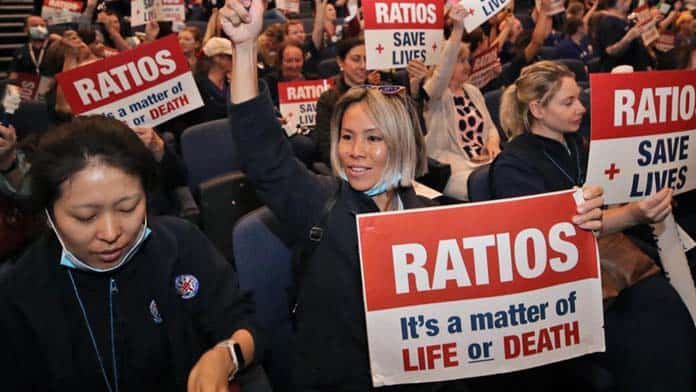WA nurses have begun industrial action, after more than two years of the pandemic, crisis level ambulance ramping at hospitals, short-staffed shifts, serious issues of over-work, and a paltry pay offer from the state Labor government.
The Australian Nursing Federation (ANF) has imposed bans on working double shifts and working overtime, with plans to ramp up the industrial campaign, imposing bed closures and an indefinite strike in about seven weeks’ time.
On 12 October nearly 2000 nurses attended a stop-work meeting at the Perth Convention Centre. On the agenda was a list of resolutions demanding pay rises of 5 per cent a year, plus top-up payments to account for inflation and an immediate $3000 “cost of living” payment for public sector nurses and midwives.
Motions moved by members from the floor increased the claim to a 10 per cent a year pay rise and a $4500 payment, as nurses argued they deserved more given the lack of staffing and ongoing strain on the state’s health system. Nurses are also fighting for nurse-to-patient ratios equivalent to those in place in Victoria, Queensland and the ACT.
The motions in support of industrial action passed with uproarious cheers, leaving no doubt of the support for action.
ANF State Secretary Janet Reah said that nurses would not “continue to fill the gaps on the rosters created by a government that won’t take reasonable steps to match the demand on the health services with the supply of nurses and midwives.”
But as we went to press union officials were saying they were “close to agreement” with the government despite a below inflation pay offer nowhere near what members voted for.
WA Premier Mark McGowan is urging nurses to accept what he calls a “big win” on offer—a 3 per cent a year pay increase plus a $3000 one off cost of living payment.
But nurses have rejected the offer, as well as McGowan’s statement that he was hopeful ratios could be introduced within three years!
Workers across the public sector are demanding higher pay in the face of the surging cost of living. Community and Public Sector Union members in the public service, school support staff and child protection staged lunchtime actions and walked out of work to rally in Perth on 26 October.
Even the WA Police Union said police were, “frustrated, annoyed and somewhat angry” as they are still without an offer, four months after their current agreement with the government expired. Police will launch a month of industrial action over their pay and conditions claim.
McGowan has been increasingly speaking of the need for fiscal conservatism in the face of global economic storm clouds. “Every major indicator is now saying there’s going to be a worldwide recession,” McGowan told the WA Parliament. It’s another indication state Labor governments will not deliver the pay rises and staffing needed across hospitals, schools and the public sector.
Workers are rightfully fed up. State and federal politicians can talk about keeping inflation in check but wages in Australia have been stagnant for nearly a decade while corporate profits keep growing.
Workers can’t survive on good will and platitudes. Many are waking up to the fact that if they want pay and conditions to improve they will have to fight for them.
By Phil Chilton






